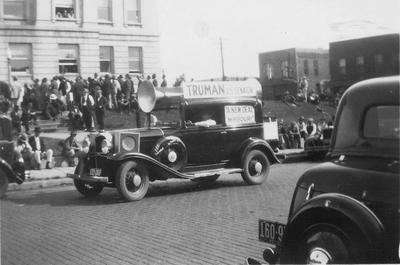[Editor’s Note: This post is in response to “Vinyl Prayers,” John Modern’s portal into Reverberations’ unfolding compendium of resources related to the study of prayer.]
In 1935, Samuel Saia, a garbage collector from Buffalo, New York, and a devout Jehovah’s Witness, purchased an electroacoustic loudspeaker and affixed it to the roof of his Studebaker automobile. On a weekly basis, he would drive up and down the streets of upstate New York, using a portable phonograph to broadcast the recorded sermons of “Judge” Joseph Rutherford to all who could hear. Saia’s practice was common among Jehovah’s Witnesses of his time, who took advantage of all sorts of media and auditory technologies to spread the word of God. But it is inadequate to think of their use of “sound cars” as merely instrumental. Instead, Saia and his co-religionists practiced what I have described elsewhere as “sound car religion.” That is, their choice of media was inextricably entangled with their message: sound cars and loudspeakers materialized their imperative to preach the gospel as loudly and widely as they could, their rejection of a popular inclusionary ideology that assumed sectarian differences were best kept to oneself, and their refusal to abide by the liberal norms of civil restraint that often seemed to govern American public spaces.



